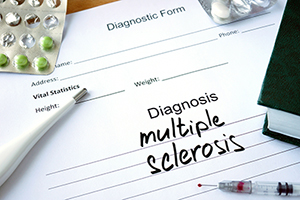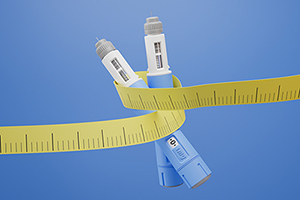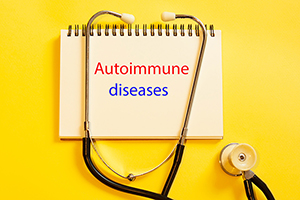



| By Dr. Ronald Hoffman
In a previous newsletter article and accompanying podcast, I outlined a dietary and supplement program for multiple sclerosis.
We also interviewed Dr. Terry Wahls, herself an MS sufferer, who attained remission through application of a Paleo Diet (the Wahls Protocol).
 This week, I’m going to summarize research on several adjunctive therapies for MS that I’ve found potentially helpful.
This week, I’m going to summarize research on several adjunctive therapies for MS that I’ve found potentially helpful.
Low-Dose Naltrexone: Among the more successful innovative therapies for MS is low-dose naltrexone (LDN), a custom-compounded prescription medication based on Naloxone, a medication used to revive patients from narcotic-induced comas and to combat opiate addiction. I summarize the mechanism of action of LDN in this YouTube interview and in this article.
Basically, it works to boost endorphins and enkephalins, “feel-good” neurotransmitters that subtly influence the immune system in a way similar to exercise, meditation, and pleasant sensations. A number of clinical trials are underway to evaluate the effectiveness of LDN for MS.
LDN works best when patients are not on powerful immuno-modulatory drugs used for MS; I only prescribe it when patients are off interferon or Tysabri or not taking steroids for an acute flare.
Cannabinoids: When I first heard that Montel Williams was using pot to treat his MS, I suspected it was just a flimsy excuse to get high; either that, or he just wanted to numb himself to the progressive disability of his condition. But there is an emerging science to the use of cannabinoids—marijuana derivatives—in the treatment of a variety of medical conditions, which I discuss in a recent podcast with Dr. Rajna Patel, an MD specifically versed in the deployment of cannabinoids for medical purposes.
Marijuana and its byproducts like cannabidiol (CBD) do more than sedate patients and make them oblivious; evidence is mounting that marijuana compounds fundamentally alter disease pathways, reducing inflammation, slowing neuro-degeneration, and relieving pain and muscle spasticity. It’s unclear if simply smoking pot offers optimal benefits to MS patients, or whether future research will confirm that carefully standardized extracts of certain sub-fractions of cannabis will yield superior results absent the “high” that some patients find disconcerting.
Estriol: The ovaries make three different types of estrogen: estradiol, estrone, and estriol. Production of estriol soars during pregnancy, a time when many female MS sufferers note freedom from relapses. Clinical trials are underway to see if high-dose estriol can safely be administered to women with MS. Of note is that among the three types of estrogen, estriol is the least likely to promote breast or endometrial cancer. 8 milligrams per day is the optimal dose, and it’s currently only available from compounding pharmacies.
IV Glutathione: Intravenous glutathione has been shown to be effective for Parkinson’s Disease. It’s a potent antioxidant that can help quell the neuro-inflammation that’s at the root of MS. Since oral glutathione is poorly absorbed, it makes sense to bypass the stomach with high doses of glutathione administered by vein.
Hyperbaric Oxygen (HBOT): Hyperbaric oxygen has yielded positive results in stroke and traumatic brain injury. While studies are mixed, there’s some evidence of response to HBOT in MS patients.
Rule out Lyme Disease: Lyme, like its relative spirochetal disease syphilis, has been called the “Great Masquerader”; when Lyme progresses beyond its initial stages, it can result in neuroborreliosis, an inflammation of the brain that may mimic Alzheimer’s, vascular dementia, multi-system atrophy, ALS, or MS. While sometimes difficult to identify and reverse at this advanced stage, there are clinical accounts of patients initially diagnosed with MS responding to high dose antibiotics.
The Mercury Connection: Among the more controversial theories about the origins of MS, it’s based on the notion that mercury is a potent neurotoxin; indeed, many of the symptoms of acrodynia—mercury poisoning—are identical to those of MS. This has led holistic dentists to target mercury fillings as a potential culprit in MS; removal and replacement must be undertaken according to a careful protocol to protect the patient from additional inadvertent mercury exposure.
Chelation therapy with DMSA or DMPS can gradually reduce the mercury burden, but must be performed under the supervision of a health practitioner well-versed in the treatment of heavy metal toxicity.
Worm Therapy: Yes, really. The importance of the Gut-Brain Connection is underscored by preliminary research which suggests that the introduction of harmless roundworms into the intestinal tract can “decoy” the immune system away from an attack on myelin, redirecting itself to target gut pathogens. MS is a modern disease; its epidemiology is closely associated with modern measures of sanitation which have eradicated parasites that afflict the majority of Third World inhabitants.
Helminth therapy (Ovamed), has been used to treat ulcerative colitis, with ancillary benefits for MS. While available only as part of research protocols in the U.S., it is currently in use in Germany (http://www.ovamed.de). Intrepid North American patients can travel there for therapy.
Though we think of declining estrogen as the hallmark of menopause, it's actually common for…

Up to 12 percent of Americans have ulcers at some point in life. Peptic ulcers…
Gallbladder disease is a modern illness. An estimated 20 million Americans have gallbladder disease. The…

New, more powerful weight loss drugs: Drugs like Wegovy, Rybelsus, Ozempic and Mounjaro/Zepbound are revolutionizing…

According to the Lancet, autoimmune disease affects one in ten people globally and it’s now…

This past week we were regaled with headlines like: High levels of niacin may increase…

Leyla Weighs In: The Erosion of Trust in Nutritional Research

Our virtual voicemail is open 24/7, so there's no need to wait to submit your questions for Dr. Hoffman. Leave a message, and you may hear your question featured on the Intelligent Medicine radio program!